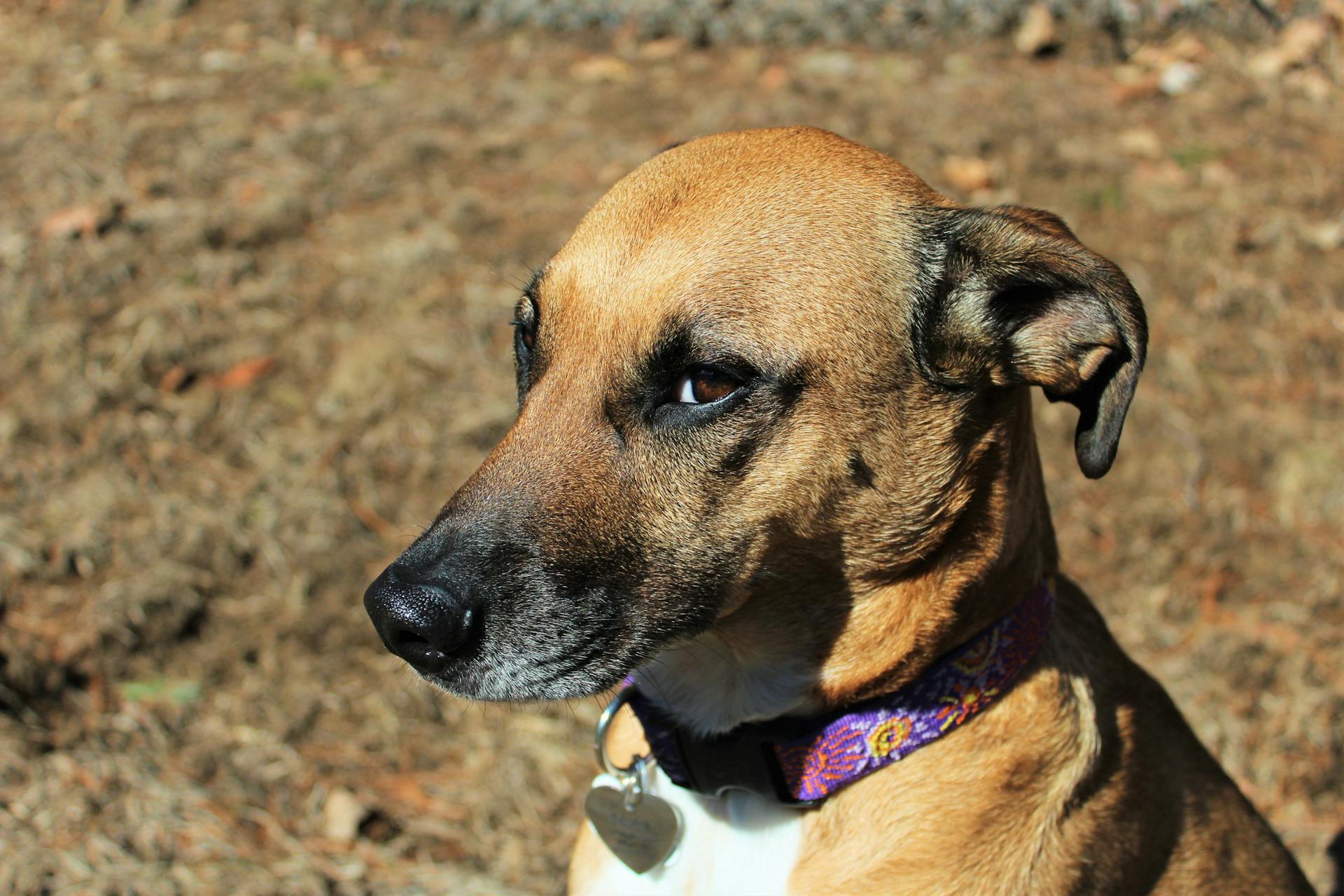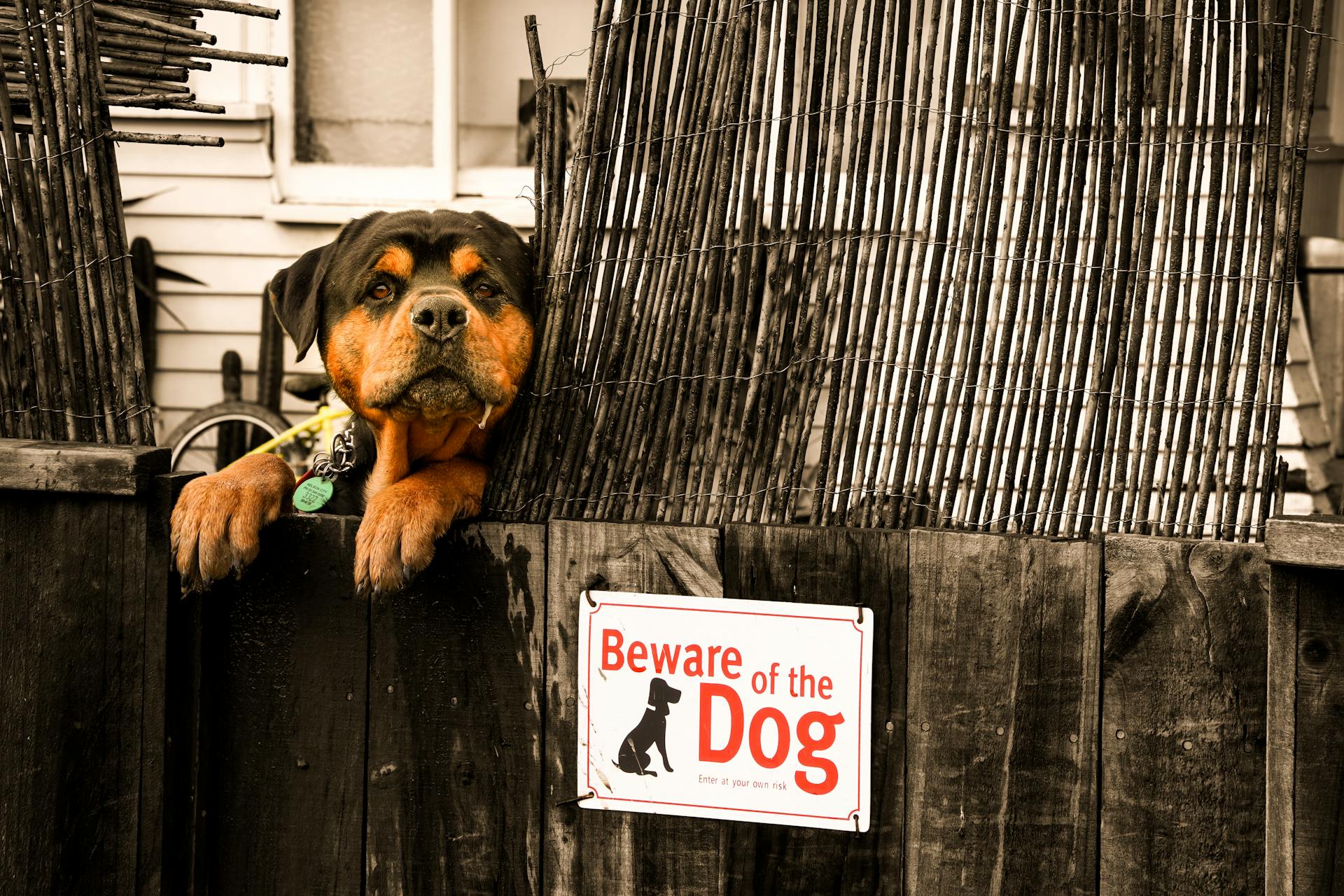
Before you leave your furry friend behind, make sure you've got all the essentials covered. Research the boarding facility and read reviews from other pet owners to ensure it's a safe and welcoming environment for your dog.
Consider your dog's personality and needs when choosing a boarding facility. If your dog is anxious or requires special care, look for facilities that offer private rooms or have experience with dogs with similar needs.
Pack a familiar item from home, like your dog's favorite toy or blanket, to provide comfort in an unfamiliar environment. This can help reduce your dog's stress levels and make the boarding experience less overwhelming.
Make sure to provide clear instructions to the boarding staff about your dog's feeding schedule, medication, and any specific habits or quirks they may have.
Explore further: What to Do with Your Dog's Ashes?
How to Prepare
To prepare for boarding your dog, it's essential to understand the rules and policies of the facility. This includes inquiring about their policies, procedures, and services, such as what food they feed the dogs, what items you can bring from home, and their emergency procedures.
You should also consider what to bring when dropping off your dog. The facility should explain what items are allowed, but common things to bring include your dog's favorite toy, food, and a piece of clothing with your scent.
Dropping off your dog can be an emotional experience for both you and your pet. To make the transition easier, keep your emotions in check and maintain a positive attitude. This will help your dog relax and adjust to their new surroundings.
Your dog may exhibit unusual behavior when they first return home from boarding. This can include clinginess, lethargy, or changes in appetite. However, these symptoms are usually temporary and should improve within a few days.
Check this out: What to Bring When You Board Your Dog?
Kennel Requirements
When you're researching a dog boarding facility, it's essential to ask about their kennel requirements. Many states require kennels to have proof of dogs' vaccination records to prevent outbreaks of life-threatening diseases.
You should ask about the kennel's immunization requirements and what basic annual vaccinations are necessary. This will give you peace of mind knowing your furry friend is protected.
Some kennels may have specific measures in place to accommodate dogs with health conditions, such as arthritis. They may offer frequent playtime breaks and daily joint supplements at mealtimes.
Broaden your view: Cost of Dog Boarding Kennels
At Least 1 Leash
At least one leash is a must-have when sending your dog to a kennel or doggie daycare. Most require sending your dog with 1 leash, but it’s always a good idea to include 2 in case the other is lost.
You should also be prepared to provide identification for your dog, such as a collar with tags or a microchip.
Kennel Immunization Requirements
When you're researching kennels for your furry friend, it's essential to ask about their immunization requirements. Many states require kennels to have proof of vaccination records to prevent outbreaks of life-threatening diseases.
Some of these diseases include parvovirus, rabies, and distemper. These are serious illnesses that can have devastating effects on your dog's health.
To ensure your dog's safety, ask the kennel about their vaccination requirements and protocols. They may ask for proof of basic annual vaccinations when you register your dog.
If your dog has a health condition, such as arthritis, be sure to ask how the kennel accommodates dogs with similar needs. This could include frequent playtime breaks and daily joint supplements at mealtimes.
Consider reading: Requirements for Boarding a Dog
Here are some questions to ask the kennel about their health and sanitation practices:
- How does the kennel ensure the overall health of its dogs?
- What measures does the kennel take to prevent the spread of diseases?
Some kennels may have specific sanitation practices, such as regularly cleaning dogs' crates or spraying down communal play areas. They may also have a quarantine system in place for dogs with concerning symptoms.
How Professional Kennels Handle Food
Professional kennels will often request that you bring your dog's food from home for the duration of their stay. This is because each dog eats different types of food.
Many kennels will have specific requirements for storing dog food, such as keeping it in an airtight container to limit exposure and potential pest contamination.
You might enjoy: Is Canidae Dog Food Good for Dogs
Bad Kennels
If a kennel refuses to give you a tour, it's a major red flag. This indicates that they may not be transparent about their facilities or treatment of dogs.
Pests, pest damage, or pest droppings in the kennel are a clear sign of poor quality care. You shouldn't have to worry about your dog being exposed to these health hazards.
Signs of uncleanliness, such as foul smells and messy floors, are also a bad sign. This suggests that the kennel may not be prioritizing the health and well-being of their canine guests.
Don't be afraid to ask about vaccination requirements. If a kennel doesn't have any, it may be a sign that they're not taking the health of their dogs seriously.
A well-run kennel should have a solid emergency plan in place. If they can't provide you with documentation of this plan, it's a cause for concern.
Having overnight staff is essential for ensuring the safety and care of dogs. If a kennel doesn't have staff on hand at night, it may not be the best choice for your pet.
Untrained staff can be a disaster waiting to happen. Make sure the kennel you choose has staff who are knowledgeable and experienced in caring for dogs.
Limited indoor or outdoor space can be a problem for dogs who need exercise or stimulation. Look for a kennel that provides plenty of room for your dog to move around and play.
Here are some specific things to watch out for when evaluating a kennel's quality:
- Pests, pest damage, or pest droppings
- Signs of uncleanliness
- No pet vaccination requirements
- Limited emergency plan documentation
- No overnight staff
- Untrained staff
- Limited indoor or outdoor space
- Inadequate containment or food and water access
Choosing a Facility
Choosing a facility is a crucial part of the dog boarding process. A good facility should have a homey feel with tile floors, painted walls, and raised dog beds.
Look for a facility with a neat and tidy appearance, with clean floors and pleasant smells. This is a top priority, as a clean facility indicates that the staff is taking good care of the dogs.
A professional facility should have flooring that's easy to clean, such as tile or concrete, and should have floor drains and slightly sloped floors to prevent accidents. Hardwood and laminate floors are not ideal for dog facilities due to their porous nature.
Here are some key things to look for in a dog boarding facility:
- Homey feel
- Neat and tidy
- Flooring for dogs (tile, concrete, etc.)
- Fresh water supply
- Lots of space
- Knowledgeable staff
- Backup power
- Other equipment (play areas, toys, etc.)
How to Choose a Facility
Choosing a facility for your furry friend can be a daunting task, but there are some key things to look for to ensure you're making the right choice. A good facility should have a homey feel, with tile floors, painted walls, and raised dog beds.

A clean and tidy facility is essential for your dog's health and well-being. Look for floors that are free of hair clumps, dirt, and food bits. Pleasant smells can also indicate cleanliness.
Professional facilities should have flooring designed for dogs, with floor drains and slightly sloped floors. Concrete floors are acceptable, but make sure there's comfortable, raised bedding. Hardwood and laminate are not ideal for dog daycare spaces.
Fresh water supply is crucial, so ensure there are clean drinking water bowls or water dispensers easily accessible. No floating food pieces in the water means it's fresh and regularly changed.
A good facility should have plenty of space for your dog to stretch out, run, and play. Avoid facilities with too many dogs in too small a space, as this can lead to aggressive behaviors.
Knowledgeable staff are a must. Observe how they interact with current clients and ask questions to gauge their knowledge. Aim for a staff-to-dogs ratio of at least 1:15.
A backup power source, such as a generator, is essential in case of a power outage. This ensures the heating and cooling system continues to function.
Recommended read: How to Stop Dog from Eating Other Dogs Food

Here are some key signs of a good facility:
- Homey feel with tile floors, painted walls, and raised dog beds
- Neat and tidy with clean floors and pleasant smells
- Flooring designed for dogs with floor drains and slightly sloped floors
- Fresh water supply with clean bowls or dispensers
- Plenty of space for dogs to stretch out, run, and play
- Knowledgeable staff with a good staff-to-dogs ratio
- Backup power source, such as a generator
Kennel-Safe Toys
When choosing a facility for your furry friend, it's essential to consider the types of toys they'll be using. Look for facilities that provide kennel-safe dog toys.
Rubber, plastic, and nylon toys can be hand-washed in a large sink with warm water and antibacterial soap. This is a great way to keep them clean.
Some kennels may even use a special wash made of one part vinegar and two parts water for really messy toys. This solution is gentle yet effective.
Rope toys that are just rope, without any plastic or metal parts, can be tossed in the washing machine and machine-dried on low.
For more insights, see: Dogs under Water
Facility Evaluation
A physical tour of the facility is a must when choosing a dog boarding kennel. This allows you to examine the place in person, get to know the staff, and see firsthand how they interact with animals in their care.
Look for a homey feel, with features like tile floors, painted walls, raised dog beds, and sometimes a television or radio playing in the background. It should have a neat and tidy appearance, with clean floors free of hair clumps, dirt, and other debris.
A good dog kennel should have flooring that's easy to clean, such as tile or concrete, and should be slightly sloped to prevent water from accumulating. Fresh water supply is also crucial, with clean drinking water easily accessible and no floating food pieces in the water.
Here are some key signs of a good dog kennel:
- Homey feel
- Neat and tidy
- Flooring for dogs (tile, concrete, or slightly sloped floors)
- Fresh water supply
- Lots of space
- Knowledgeable staff
- Backup power
- Other equipment (play equipment, toys, etc.)
A well-run dog boarding service would be eager to show you everything, including the space where meals are prepared and the dog play areas. Be wary of kennels that don't require immunization records or seem disinterested in your pet.
Documents Required
When evaluating a dog kennel or pet daycare, it's essential to review the documents required to ensure the health and well-being of your furry friend.

You'll likely be asked to provide proof of vaccination records, which is crucial in preventing outbreaks of life-threatening diseases like parvovirus, rabies, and distemper.
Be prepared to present all necessary documents on drop-off day, including medical records, vaccination charts, contracts, and rule acknowledgment forms.
Some kennels may also require additional documentation, such as proof of spaying or neutering, or a health certificate from your veterinarian.
Here's a list of common documents you may need to provide:
- Proof of vaccination records
- Medical records
- Vaccination charts
- Contracts
- Rule acknowledgment forms
- Proof of spaying or neutering (if applicable)
- Health certificate from your veterinarian (if applicable)
Don't be afraid to ask about the kennel's immunization requirements or how they accommodate dogs with health conditions, such as arthritis or other special needs. This will give you a better understanding of their policies and procedures.
Things to Consider
Scheduling a tour of a boarding facility is a must. This allows you to see the place in person, get to know the staff, and observe how they interact with animals.
Look for a homey feel, with features like tile floors, painted walls, raised dog beds, and a TV or radio playing in the background. A clean and tidy environment is essential, with floors free of hair clumps, dirt, and other debris.

Professional-quality flooring, such as floor drains and slightly sloped floors, is a good sign. However, hardwood and laminate flooring is not ideal for dog daycare spaces due to its porosity.
Fresh water supply is crucial, with clean drinking water easily accessible and no floating food pieces in sight. The facility should also provide plenty of space for dogs to stretch out, run, and play.
A knowledgeable staff is vital, with a low staff-to-dogs ratio of at least one person per 15 dogs. They should be able to address problems and provide adequate care.
Some important things to consider when evaluating a boarding facility include:
- Contacting the kennel or dog sitter well in advance to schedule a visit.
- Doing your homework and researching the facility's certifications and reputation.
- Asking about required immunizations and health checks.
- Looking for a clean, safe, and sanitary environment.
- Meeting the caregivers and observing how they interact with dogs.
- Checking the facility's backup power and emergency preparedness.
- Asking about provisions for the comfort of boarders, such as fresh drinking water and temperature control.
It's also essential to evaluate the staffing situation, including the number of staff on site and their qualifications. A night shift and emergency preparedness plan are also important considerations.
Can You Board?
When you're looking for a boarding service, it's essential to consider your dog's unique needs. You can board a dog with health conditions or behavioral concerns, but it's crucial to discuss these matters with the staff upfront.

There are many boarding services that are well-equipped to accommodate a dog's behavioral or health considerations. Transparency is key when researching a particular service, so be open about issues regarding separation anxiety or resource-guarding.
If your dog requires close monitoring due to an illness, you can find a boarding service that will keep a watchful eye on them. Discussing these matters with the staff will help you find the right fit for your furry friend.
Expand your knowledge: What Are Service Dogs
Frequently Asked Questions
How to pack dog food for boarding?
Pack dog food in pre-measured portions using small plastic baggies labeled "Breakfast", "Lunch", and "Dinner" for a smooth boarding experience. This ensures your dog receives the right amount of food at each meal.
Do dogs get lonely in boarding?
Dogs can experience anxiety and behavioral changes when left in a boarding facility for the first time, making the initial days challenging for them. This is similar to how a child might feel in a new environment with unfamiliar people.
Sources
- AKC Rx (akcpetrx.com)
- parvovirus (avma.org)
- what to pack for your dog's boarding stay (underdog-kennels.com)
- Ultimate Guide to Dog Boarding: Ensure Comfort & Well- ... (hotdiggitydogresort.com)
- What to Look for When Boarding Dog | South Charlotte Vets (sharonlakes.com)
Featured Images: pexels.com


